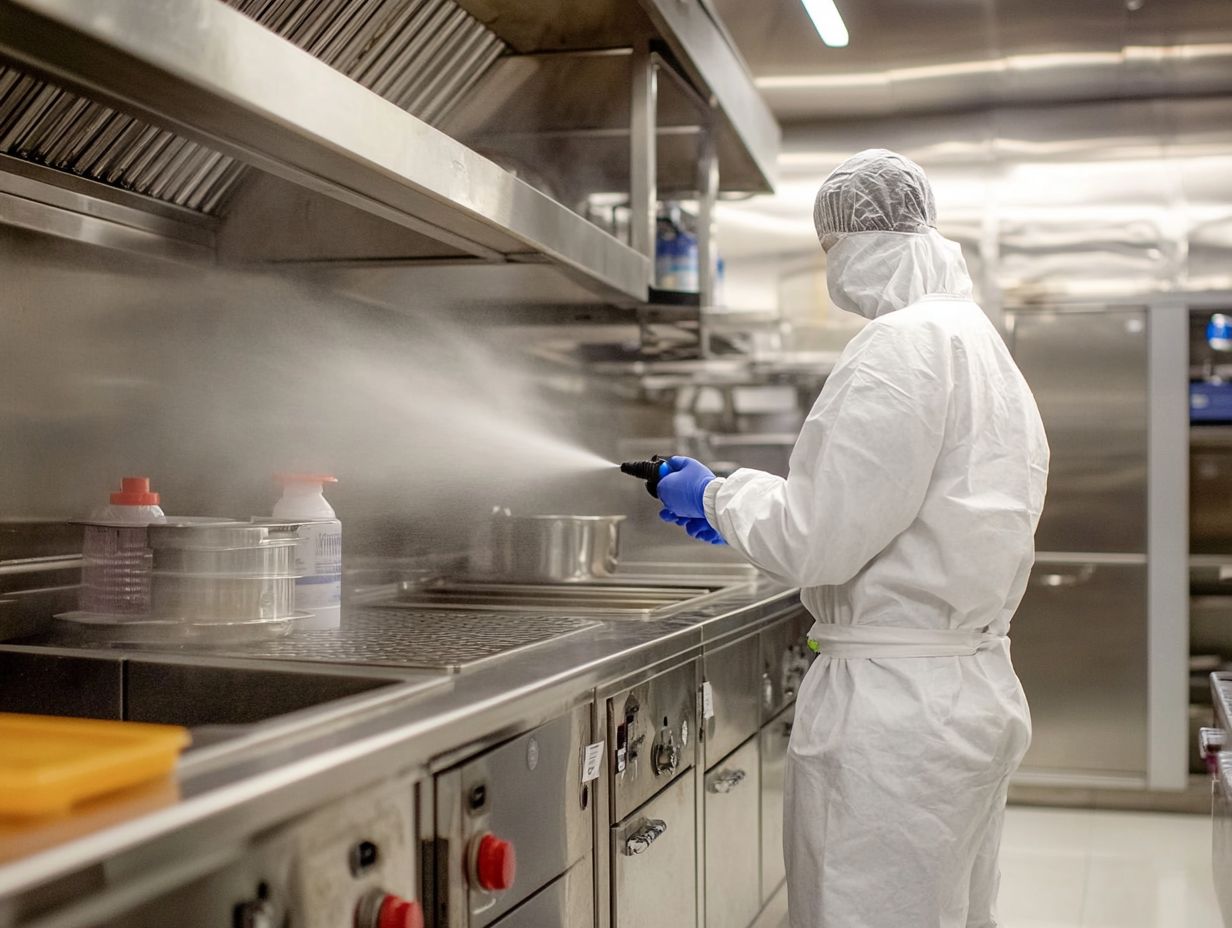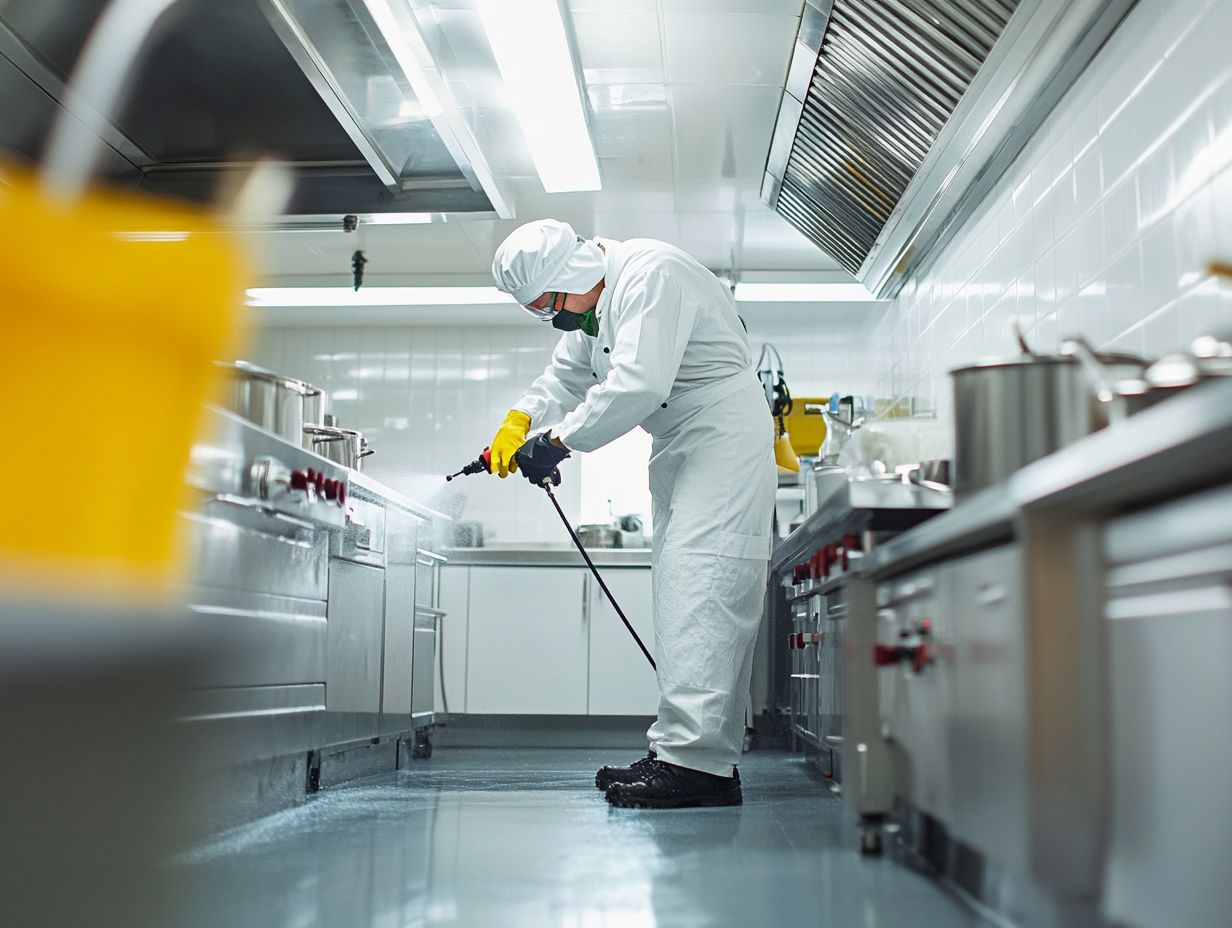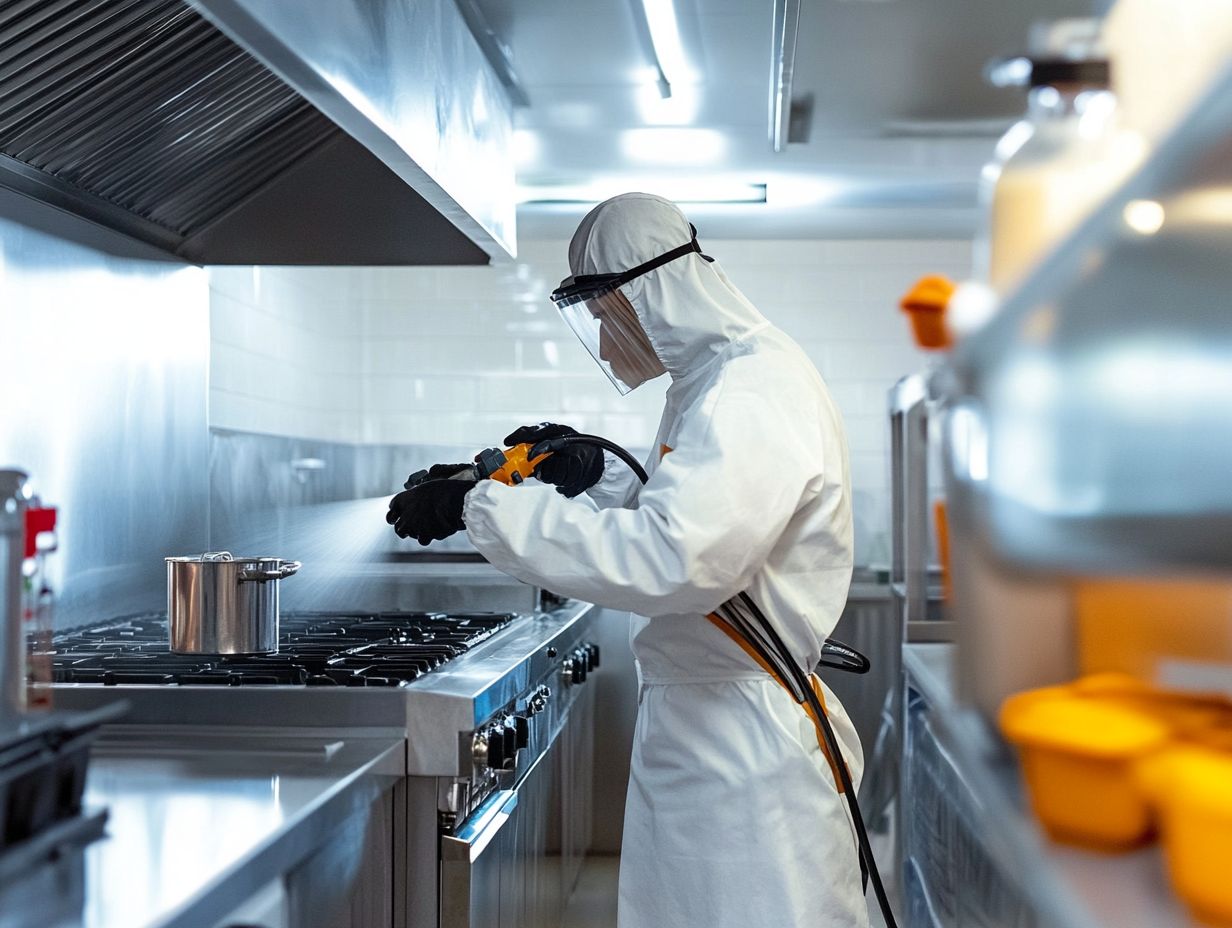Pest control isn’t just about keeping things clean; it’s a key part of creating a professional, safe, and healthy environment for both your employees and your customers.
If you ignore pest issues, you could face some serious consequences, like health risks, property damage, and a reputation that's harder to fix than a leaky roof.
This article dives into why effective pest control is essential for your business, the potential risks of neglecting it, and practical tips for picking the right pest control company. You’ll also find various pest control methods and preventive measures to help keep your workspace pest-free.
So, keep reading to protect your business from those unwelcome invaders!
Why is Pest Control Important for Businesses?

Pest control is super important for your business, especially in commercial settings. It helps keep your environment clean and sanitary, which protects both your reputation and your bottom line.
If you don’t have effective pest management in place, you could face some serious risks like health violations, unhappy customers, and potential infestations that could throw a wrench in your operations.
Plus, following health regulations isn’t just a legal obligation; it’s essential for maintaining the overall hygiene and safety of your commercial property.
In this guide, you’ll discover why pest control is a must for businesses of all sizes and how it can contribute to your long-term success.
What are the Risks of Not Having Pest Control in Businesses?
If you fail to implement effective pest control measures, your business could be opening the door to a whole slew of risks—think health hazards, property damage, and financial losses. Without regular pest inspections and proper identification, that little pest problem could snowball into a full-blown infestation, leading to health regulation violations and some pretty hefty fines.
Plus, if pests make a comeback after an outbreak, it can seriously disrupt things, shaking customer trust and dragging down employee morale. Understanding these risks is key to developing a solid pest control plan that keeps your business safe.
Tackling pest problems proactively isn’t just about following the rules; it also plays a huge role in how well your operations run. When infestations are left unchecked, you could face machinery breakdowns or inventory damage, which means unexpected expenses that you definitely don’t need.
Your reputation is also on the line—if customers or clients spot signs of pests, they might just take their business to your competitors. The financial fallout can be brutal, with costs piling up from clean-up efforts, legal fees, and lost repeat business.
By prioritizing risk assessment and effective pest management practices, you can create a healthier environment for both your employees and customers, ultimately building loyalty and ensuring sustainable growth.
How to Choose a Pest Control Company for Your Business?
Choosing the right pest control company for your business is a big deal that can really impact your pest management strategies and how efficiently you operate. With so many pest control services out there, it’s important to check their expertise and reputation in the pest management world.
You’ll want to look for pest control contracts that provide comprehensive services tailored to your specific needs, while also keeping an eye on the company’s approach to customer satisfaction and pricing.
In this section, you'll find a guide on the essential factors to consider when picking the perfect pest control partner.
What to Look for in a Pest Control Company?
When you're on the hunt for a pest control company, it's key to pinpoint the attributes that will get you effective and reliable services tailored to your needs. Look for companies that use advanced pest control technology and have a solid track record of successful pest management solutions. Checking the pest control training and certifications of their technicians can also give you a good sense of their credibility and adherence to industry best practices, which is essential for handling various pest issues efficiently.
Don’t forget to ask about their approach to customer service and support. A dedicated company will prioritize open communication and keep you informed about pest prevention strategies. Also, see if they offer integrated pest management techniques that consider environmental impact while still getting rid of those pesky pests.
Lastly, make sure they’re compliant with local regulations and have the necessary licensing and insurance. These factors are crucial as they reflect the company’s accountability and professionalism in delivering pest management solutions.
What Questions to Ask When Hiring a Pest Control Company?
Before you hire a pest control company, it's super important to ask the right questions to make sure they fit your business's specific needs and follow industry standards. Check out their pest control reviews, ask about their compliance with regulations, and get the scoop on the methods they use for pest inspections and management.
Getting a sense of their approach to pest management will help you see how proactive they are about preventing infestations and keeping up with local regulations. You might want to ask how often they do inspections and what specific protocols they follow to catch potential pest issues. Don't shy away from asking about their certifications and the training their staff receives to stay on top of industry advancements.
Having a good chat about their experience with different pest problems in various environments will give you valuable insights into their qualifications and whether they can tackle the unique challenges your business might face.
What are the Different Types of Pest Control Methods for Businesses?

Understanding the different types of pest control methods available to you is key to figuring out the best approach for managing pests in your business. You’ve got options ranging from traditional chemical treatments to eco-friendly solutions, each with its own perks and challenges.
It's important for you to assess the specific pest problems you're dealing with and choose removal strategies that fit your operational practices and meet environmental safety standards.
In this section, you'll find an exploration of the most effective pest control methods tailored to meet your unique business needs.
1. Chemical Pest Control
Chemical pest control means using insecticides and pesticides to tackle pests effectively. While this method can deliver quick results when dealing with infestations, you really need to keep an eye on pesticide regulations and application protocols to make sure you’re keeping the environment safe.
You should weigh the pros, like those immediate results and thorough coverage, against the cons, which can include risks to non-target species and the pesky development of pesticide-resistant pests. It’s crucial to understand the strict regulations that govern chemical applications because they’re there to protect public health and maintain ecological balance.
If you're an individual or a business, teaming up with licensed pest control professionals who prioritize safe practices can really help reduce these risks. This way, you get effective pest management while also sticking to environmental standards. Finding that sweet spot between efficiency and safety is key when you're thinking about chemical pest control methods.
2. Biological Pest Control
Biological pest control is all about using natural predators or pathogens to keep those pesky pests in check without reaching for synthetic pesticides. This eco-friendly method is gaining popularity in Integrated Pest Management (IPM) strategies because it promotes sustainability and does less harm to beneficial insects.
If you want to implement effective biological controls in your pest management plan, understanding pest population dynamics is key.
By embracing this approach, you can make pest control not just more sustainable but also more effective in the long run. Think about using natural allies like ladybugs or parasitic wasps; they can help reduce pest populations while keeping the ecosystem balanced.
Biological pest control fits perfectly into the IPM principles, offering a chemical-free alternative that cuts down on harmful pesticide use. This approach enhances soil health and promotes biodiversity. Plus, the synergy between different control methods within an IPM framework helps mitigate potential crop damage, resulting in healthier plants and better yields for you.
3. Mechanical Pest Control
Mechanical pest control is all about using physical methods like traps and exclusion techniques to keep those pesky critters at bay. This approach is a vital part of your pest control strategy, especially in commercial settings where you might want to limit chemical use. By monitoring pests, you can see how well your mechanical controls are working and make sure your pest management plan is as efficient as possible.
This method can include all sorts of tactics, from barriers that keep pests out to traps designed to capture or eliminate specific species. You can also adopt cultural practices that create an environment less inviting for pests. The effectiveness of mechanical pest control can vary depending on the type of pest and the surrounding environment, but when you use it alongside other techniques like biological and chemical controls, it can really boost your overall pest management efforts.
By integrating mechanical strategies into a comprehensive pest management system, you can achieve sustainable results, cut down on harsh chemicals, and help promote a healthier ecosystem.
4. Physical Pest Control
Physical pest control involves a variety of techniques that help you remove or deter pests without using chemicals. You can seal entry points, use barriers, and implement exclusion techniques to effectively address pest behavior and prevent infestations. It’s crucial to prioritize environmental safety when you’re using these methods in commercial settings.
The success of these strategies depends on understanding how pests behave and their life cycles. For instance, physical barriers not only keep pests out but can also disrupt their reproductive patterns, which helps reduce their populations. Techniques like trapping can give you quick results while allowing you to keep an eye on pest activity.
By integrating these approaches into your overall pest management plan, you can take a proactive stance, ensuring that your business stays pest-free while minimizing the environmental impact that often comes with chemical controls.
5. Cultural Pest Control

Cultural pest control is all about changing up your practices to keep pest populations in check through preventive measures like sanitation and proper waste management. By putting effective pest management policies into action and maintaining high standards of hygiene in your business, you can really cut down the chances of pest infestations. This proactive approach is key to achieving long-term pest control success.
By adopting these cultural practices, you not only minimize food sources for pests but also create an environment that's less welcoming to them. Regularly scheduled cleanings, proper waste disposal, and quick responses to spills can drastically limit what resources are available to any potential intruders. Training your staff on the importance of these practices creates a culture of vigilance and responsibility, further boosting your establishment’s defenses against pests.
In the end, understanding the importance of these preventive strategies is crucial for developing a solid pest management plan that focuses on sustainability. This way, you can ensure a healthy environment for both your employees and your customers.
How to Prevent Pests in Your Business?
Preventing pests in your business is key to keeping a safe and healthy environment. By putting together a proactive pest control plan that includes regular sanitation and monitoring, you can greatly reduce the risk of infestations.
Plus, training your employees on pest prevention practices makes sure everyone is in the loop and actively working to keep those pesky critters at bay. This section will share effective strategies to help you protect your business from unwanted pests.
1. Keep Your Business Clean
Keeping your business clean is one of the best strategies for preventing pests and maintaining a healthy environment. Regular sanitation practices are key to eliminating food debris and moisture that attract pests, which is crucial for effective pest management. By understanding pest behavior and putting in place targeted pest control strategies, you can significantly reduce the risk of infestations.
This means not just doing the usual cleaning but also adopting some smart practices to deter specific pests. For example, make sure all food items are stored in tightly sealed containers and promptly clean up any spills to cut off food sources that pests might feast on. Regularly inspecting areas prone to moisture, like kitchens and restrooms, can help you catch problems before they escalate into infestations.
By clearing out clutter and routinely disposing of trash, you create an unwelcoming environment for pests. When you combine these diligent cleaning habits, you're setting the stage for a pest-free workspace.
2. Seal Entry Points
Sealing entry points is a vital part of pest prevention that can really help keep those unwanted pests out of your business. When you use effective exclusion techniques, you significantly lower the chances of pest problems creeping in. By incorporating sealing practices into your pest control plan, you're not just protecting your property; you're also boosting the overall success of your pest monitoring efforts.
By effectively closing up gaps, cracks, and holes in both the outside and inside of your building, you greatly reduce the chances of pests sneaking in through those vulnerabilities. Some common sealing practices include using caulk, foam insulation, and weather stripping to ensure your doors and windows are tightly sealed, making it much tougher for pests to get inside.
Regularly inspecting and maintaining these barriers is essential, as it helps you catch any wear and tear that might compromise their effectiveness. And maybe most importantly, taking a proactive sealing approach not only keeps pests at bay but also supports a more well-rounded pest management strategy, creating a healthier and pest-free environment for everyone.
3. Properly Store Food and Waste
Properly storing food and managing waste is crucial for keeping pests at bay in your business. By implementing strict sanitation and waste management practices, you can eliminate food sources that attract pests, changing their behavior and reducing the chances of an infestation. This proactive approach is a vital part of any effective pest control strategy.
Make sure to store food in airtight containers; this not only keeps everything fresh but also keeps those pesky insects and rodents away from leftovers and spilled grains. Regularly checking for expired items helps maintain a clutter-free space, making it less inviting for pests. If you’re running a commercial kitchen, it’s especially important to keep surfaces clean and dispose of waste promptly to create an unwelcoming environment for any unwanted guests.
Establishing a routine for waste disposal can significantly lower the risk of attracting pests, ultimately supporting a healthier establishment that follows the best practices for pest prevention.
4. Regularly Inspect for Pests

Regularly checking for pests is a key part of effective pest management and prevention. By keeping an eye on pest activity, you can spot any unusual behavior and identify potential infestations early, which lets you take action before things get out of hand. Incorporating routine pest inspections into your pest control plan helps you stay vigilant and proactive against any pest threats.
These inspections do more than just catch problems before they escalate; they also help create a safe and healthy environment for your employees and customers. When you prioritize regular checks, you can build comprehensive strategies that align with your business goals while keeping those pesky disruptions at bay.
Understanding the habits and population dynamics of pests can really boost the effectiveness of your pest control measures, leading to more sustainable management practices. In the end, fostering a culture of consistent pest inspections shows your commitment to quality and safety, which is increasingly recognized as essential for any successful establishment.
Frequently Asked Questions
What is pest control for business?
Pest control for business refers to the management and prevention of pests such as insects, rodents, and other unwanted animals in commercial or industrial settings.
Why is pest control important for businesses?
Pest control is important for businesses because pests can damage property, contaminate products, and spread diseases, which can result in financial losses and damage to a company's reputation.
What are some common pests that businesses face?
Some common pests that businesses face include rodents like mice and rats, insects such as ants and cockroaches, and birds like pigeons. Other pests may include termites, bed bugs, and flies.
How can businesses prevent pest infestations?
Businesses can prevent pest infestations by maintaining a clean and hygienic environment, sealing off entry points, regularly inspecting and monitoring for pests, and implementing proper waste management practices.
Are there any eco-friendly pest control solutions for businesses?
Yes, there are eco-friendly pest control solutions available for businesses. These include the use of natural repellents, traps, and biological control methods such as introducing natural predators to control pest populations.
When should a business seek professional pest control services?
A business should seek professional pest control services if they have a severe pest infestation that they are unable to manage on their own, or if they want to implement preventative measures to ensure their property remains pest-free.

